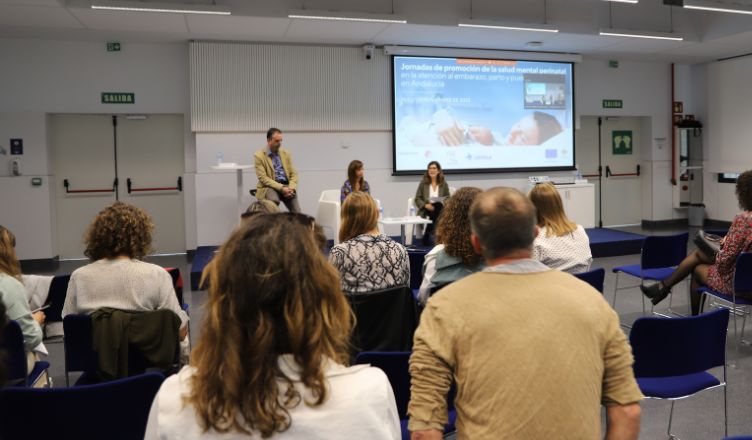Universidad Loyola, in collaboration with the Asociación Andaluza de Matronas, hosted a significant event focusing on perinatal mental health in Andalusia. The e-Perinatal project-led event drew over a hundred professionals, discussing advancements in mental health research and practices during pregnancy and postpartum, including the development of a supportive app for new parents.
Over a hundred perinatal health care professionals, especially midwives, attended a training session on November 15 and 17 at Universidad Loyola to bring existing research on mental health in this field closer to professionals.
This activity fulfills the mission of promoting the continuous training of midwives, bringing research closer to this area, and promoting spaces for collaboration and discussion with academic experts on pregnancy, childbirth, and postpartum, and more specifically, in this case, on mental health associated with this field.
The event is organized by the e-Perinatal project of Universidad Loyola, dedicated to the prevention of mental health disorders associated with pregnancy and the first year after childbirth. Researchers at Universidad Loyola are developing a personalized app for mothers and their partners. This is a pioneering study in analyzing how to prevent depression in parents or partners and the effectiveness of such interventions in babies, bringing this knowledge to professionals and society.
The conference featured experts in this field, such as Rafael Arcángel Caparrós, a midwife and professor at the Universidad de Granada, who reflected on the prevalence and clinical course of perinatal mental health problems. The consequences of these problems, risk factors, and current tools for evaluation, detection, and diagnosis were the main topics addressed by the expert.
On the first day, Roser Palau, a researcher at Universidad Pompeu Fabra and director of a digital project to improve mothers’ mental health, DANA, gave a lecture focused on digital intoxication and the pathologization of pregnancy. The scientist outlined the most relevant aspects of the social context of searching for maternal health information today.
Lastly, the first day concluded with a presentation by Emma Motrico, a researcher at Universidad Loyola and director of the e-Perinatal project. The scientist discussed the prevention of perinatal mental health problems. She presented a series of current evidence and the advancements of the e-Perinatal project, including the development of a comprehensive support application for parents in the perinatal period.
Esther Ramirez Martos, during her intervention on traumatic processes in the perinatal period The second day was initiated by health psychologist Esther Ramírez Martos, an expert in family and perinatal therapy and a lecturer at the European Institute of Perinatal Mental Health. The intervention focused on addressing common traumatic processes such as perinatal death or the impact of fertility treatments.
The final intervention was by psychiatrist Raquel Carmona, an expert in perinatal mental health, who delved into the approach to common mental health problems in Andalusia in special Perinatal Mental Health units. The physician discussed psychopharmacology during this period and presented a practical case of referral. The expert highlighted the importance of research in the development of new specific drugs for mental health disorders associated with this stage.
The closing was conducted by Irene Agea, president of the Asociación Andaluza de Matronas, who concluded the event with a motivational speech, encouraging the continuation of this training. The president thanked Emma Motrico for her support, saying, “we have been able to express our concerns and she has made them a reality in these sessions.”
